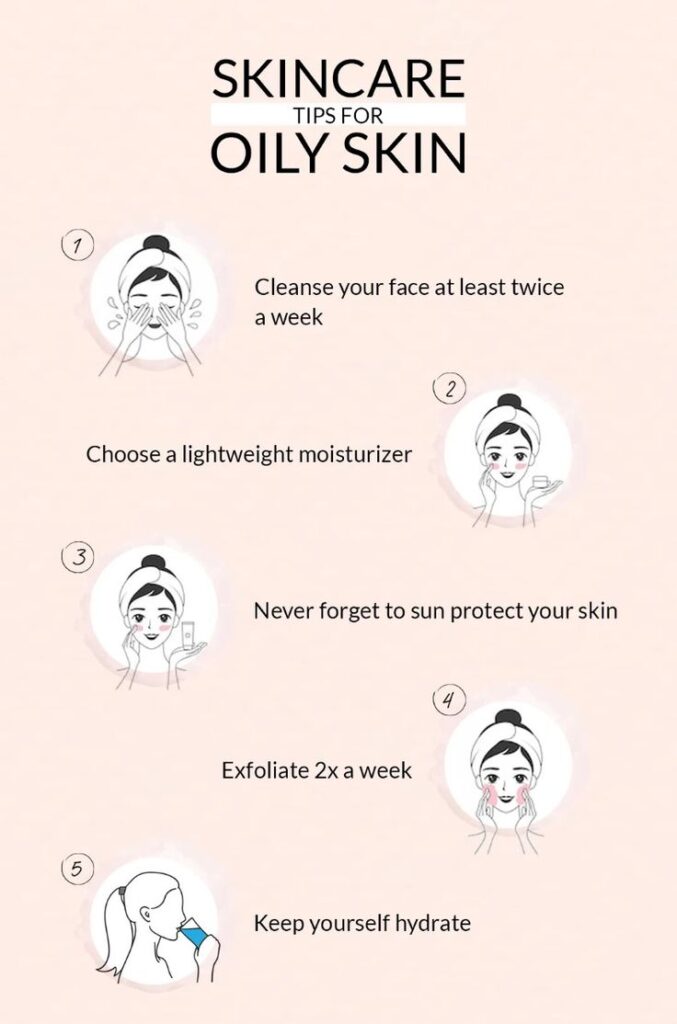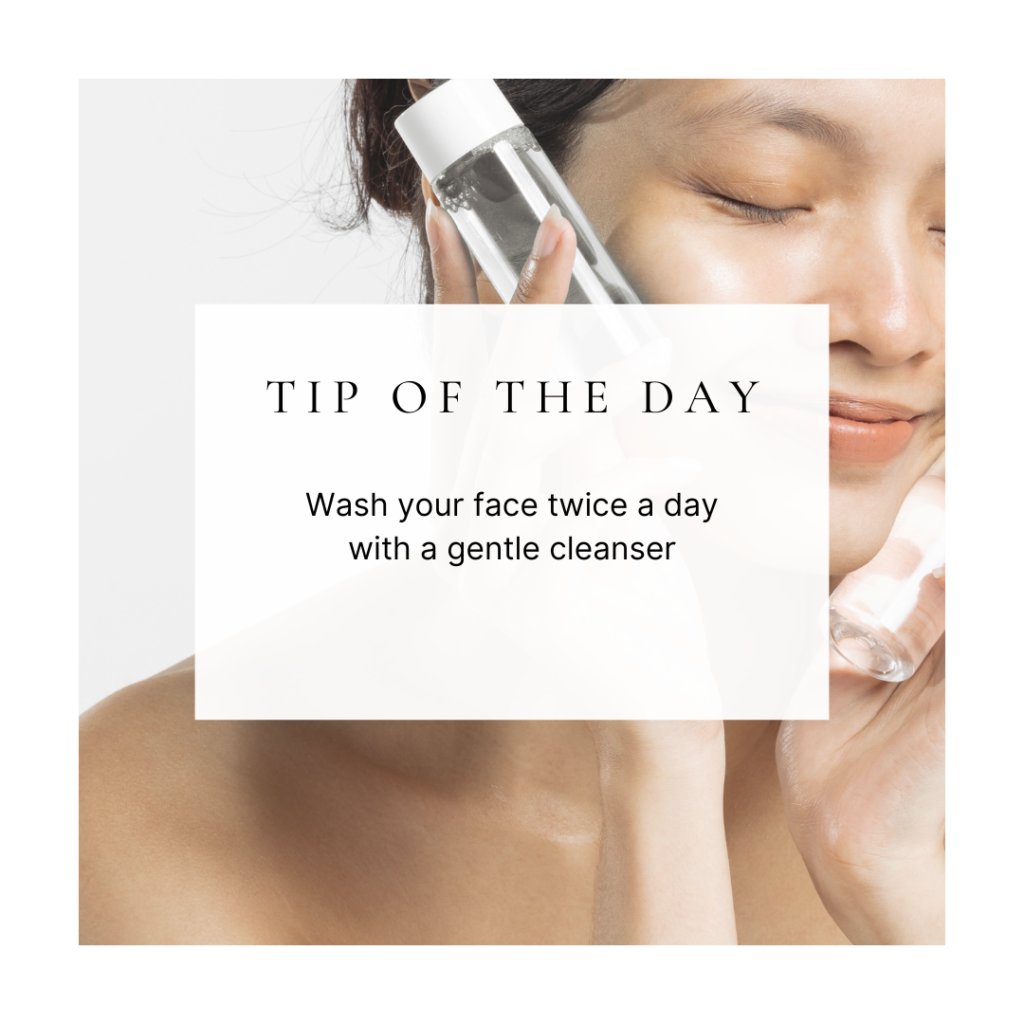Skincare is a personalized journey—each skin type requires a unique approach to bring out its best. Understanding your skin type and its needs can make a huge difference in achieving healthy, radiant skin. Whether you have oily, dry, combination, or sensitive skin, this guide will cover essential products, tips, and routines to help you glow.
Understanding Your Skin Type
Before diving into specific routines and product recommendations, it’s important to understand the basic skin types:
- Oily Skin: Characterized by excess sebum production, leading to a shiny or greasy appearance. People with oily skin often experience enlarged pores and are prone to acne.
- Dry Skin: Lacks moisture and may feel tight, rough, or flaky. Dry skin is prone to sensitivity and irritation, particularly in harsh weather conditions.
- Combination Skin: A mix of both oily and dry areas, usually with an oily T-zone (forehead, nose, and chin) and drier cheeks.
- Sensitive Skin: Reacts easily to environmental factors and certain products, leading to redness, itching, or irritation.
The Essentials: Key Products for Every Skin Type
No matter your skin type, there are a few basic steps that form the foundation of a good skincare routine: cleansing, moisturizing, and protecting with SPF. However, how you choose these products should be tailored to your skin’s specific needs. Here’s a breakdown of skincare essentials for each skin type.
1. Skincare for Oily Skin
Oily skin requires balance—while you want to control excess oil, you also need to keep your skin hydrated.
Morning Routine
- Cleanser: Opt for a gentle foaming or gel cleanser that helps remove excess oil without stripping your skin. Look for ingredients like salicylic acid, which can help prevent breakouts by clearing pores.
- Toner: A toner with witch hazel or niacinamide can help control oil production, minimize pores, and reduce shine.
- Moisturizer: Use a lightweight, oil-free moisturizer with hydrating ingredients like hyaluronic acid. Avoid heavy creams, which can clog pores.
- Sunscreen: Choose a mattifying SPF with at least SPF 30. Mineral sunscreens with zinc oxide are great for oily skin as they tend to be less greasy.
Evening Routine
- Cleanser: Double cleanse if you wear makeup or sunscreen, starting with an oil cleanser to break down product buildup, followed by a water-based cleanser.
- Exfoliant (2-3 Times a Week): Chemical exfoliants, like BHA (salicylic acid), can help keep pores clear and reduce oil.
- Moisturizer: Stick with a lightweight, non-comedogenic moisturizer.
Pro Tip for Oily Skin: Avoid over-washing, as it can cause your skin to produce even more oil to compensate.

2. Skincare for Dry Skin
Dry skin lacks natural moisture, which makes it prone to flakiness and sensitivity. Hydration is the key to keeping dry skin healthy and comfortable.

Morning Routine
- Cleanser: Use a gentle, hydrating cleanser or a creamy cleanser that won’t strip your skin’s natural oils.
- Toner: A hydrating toner with glycerin or hyaluronic acid helps to lock in moisture and prepare your skin for other products.
- Moisturizer: Look for rich, hydrating creams containing ceramides, hyaluronic acid, or squalane. These ingredients help strengthen the skin barrier and lock in moisture.
- Sunscreen: A hydrating SPF will add an extra layer of moisture and protect against UV damage.
Evening Routine
- Cleanser: Stick with the same gentle cleanser you use in the morning.
- Serum: Use a hydrating serum, like one with hyaluronic acid, to add an extra layer of moisture.
- Moisturizer: A richer night cream or a facial oil (like rosehip or jojoba) can provide extra nourishment overnight.
Pro Tip for Dry Skin: Use a humidifier in colder months to add moisture to the air and prevent your skin from drying out.
3. Skincare for Combination Skin
Combination skin requires a delicate balance to manage both oily and dry areas.

Morning Routine
- Cleanser: A gentle, gel-based cleanser works well for combination skin, as it won’t dry out the cheeks but will effectively cleanse the oily T-zone.
- Toner: Choose a balancing toner with ingredients like niacinamide, which can help regulate oil without overdrying.
- Moisturizer: A lightweight, hydrating moisturizer is ideal. You can use a heavier cream on drier areas if needed.
- Sunscreen: Go for a lightweight SPF that won’t clog pores. Gel or fluid sunscreens are often good for combination skin.
Evening Routine
- Cleanser: Continue with the gel cleanser from the morning routine, or double cleanse if needed.
- Serum: Look for serums that contain niacinamide or hyaluronic acid to help balance hydration across your skin.
- Moisturizer: Apply a moisturizer that suits both dry and oily areas, or use two different moisturizers if necessary.
Pro Tip for Combination Skin: Multimasking—using different masks on different areas of your face—can target each skin zone specifically. For example, a clay mask on your T-zone and a hydrating mask on your cheeks.
4. Skincare for Sensitive Skin
Sensitive skin needs gentle, calming products to prevent irritation. Minimal, fragrance-free ingredients are ideal.
Morning Routine
- Cleanser: Use a mild, fragrance-free cleanser. Avoid anything with harsh exfoliants or sulfates, which can cause irritation.
- Toner: A calming toner with ingredients like chamomile or aloe vera can soothe redness and inflammation.
- Moisturizer: Choose a hypoallergenic, fragrance-free moisturizer with soothing ingredients like ceramides or oatmeal.
- Sunscreen: Mineral-based sunscreens with zinc oxide or titanium dioxide are typically well-tolerated by sensitive skin.
Evening Routine
- Cleanser: Stick to the same gentle cleanser from your morning routine.
- Serum: If you use serums, look for soothing formulas with niacinamide or green tea extract, which can calm inflammation and strengthen the skin barrier.
- Moisturizer: Apply a soothing moisturizer before bed. Consider adding a facial oil like argan or chamomile oil if your skin is particularly dry or irritated.
Pro Tip for Sensitive Skin: Avoid trying too many new products at once. Introduce one product at a time and patch-test first to minimize reactions.
Must-Have Ingredients for Every Skin Type
Regardless of your skin type, certain ingredients can provide universal benefits:
- Hyaluronic Acid: A hydrating powerhouse, great for adding moisture to all skin types.
- Niacinamide: Helps control oil, reduces redness, and strengthens the skin barrier.
- Vitamin C: A potent antioxidant that brightens skin and promotes collagen production (best for non-sensitive skin types).
- Ceramides: Essential for dry and sensitive skin, as they help repair the skin barrier and retain moisture.
General Skincare Tips for All Skin Types
- Avoid Over-Exfoliating: While exfoliating can keep your skin smooth and clear, doing it too often can strip away essential oils, leading to irritation.
- Drink Plenty of Water: Hydrated skin starts from within, so aim to drink enough water throughout the day.
- Be Consistent: Establish a routine and stick with it. Results in skincare often take time, so patience is key.
- Adjust with the Seasons: Your skin’s needs may change with the weather. Consider using heavier products in winter and lighter ones in summer.
Final Thoughts
Taking care of your skin is a journey, and understanding your unique skin type is the first step. By choosing the right products and following a consistent routine, you’ll be well on your way to healthier, more radiant skin.

